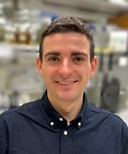Raffael Schumann rls87@cam.ac.uk
Switzerland
Biological Sciences @ MRC LMB, Pembroke College
PhD thesis: TBC
Research interests:
- Synthetic genomics
- Codon compression
- Non-canonical genetic codes
- Orthogonal genetics
The universality of the genetic code spans the arch between all living organisms. The central dogma, meaning the read-out of information from DNA and the production of polypeptides, can be utilized across organisms in order to create novel biological systems and products. However, the standard genetic code limits us to a restricted set of building blocks. The branch of codon compression and genetic code expansion has managed to find ways to rewrite genomes in a way that allows for the incorporation of more than the 20 canonical amino acids into proteins. To this end, new genomes have to be engineered across their entirety. Despite a rise in the number and efficacy of tools for genetic engineering, this is a lengthy and labor-intensive task. During my PhD, I will work towards developing faster, more reliable, and more scalable methodologies to build whole genomes of different organisms with an alternative or expanded genetic code.
Who or what inspired you to pursue your research interests?
I was automatically drawn to synthetic biology, a field addressing the construction of novel biological systems not directly observed in nature. Initially, I was fascinated by biological circuits and biosensors. During my master thesis in the US, I came across the work of the Chin Lab in Cambridge. This work unites rational design and novel insights in order to engineer each step of the central dogma of biology and thereby the most fundamental aspects of life. It leads to brand new methodologies for genome design and assembly, an expanded set of building blocks for proteins, and even virus resistant cells thanks to alternative genetic codes – a dynamic space with exciting breakthroughs guaranteed!

